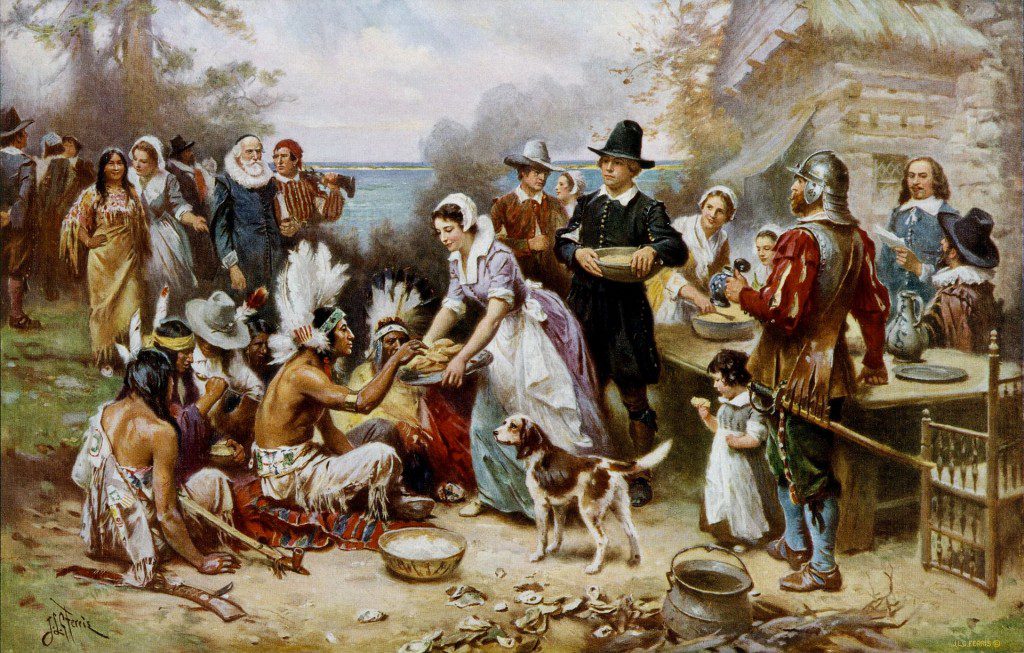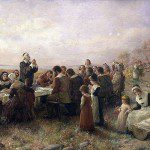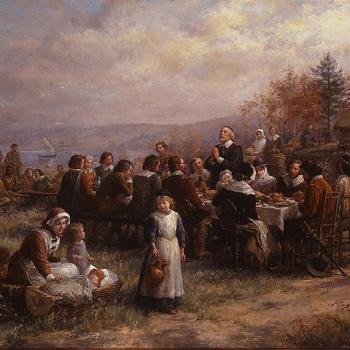
Wikimedia Commons public domain
I published this column in the Deseret News for Thanksgiving 2013:
It’s the season of Thanksgiving, and, so, minds like mine turn naturally to etymology, to word origins. Please be patient. There is method in my madness.
The origin of the word “religion” is obscure, and has been much debated. But all suggestions for it seem to agree that remembrance, an awareness of dependence and obligation, is at the core of what it means to be religious. The ancient Roman politician and writer Cicero derived the word from “legere,” “to read,” believing that it meant “to go over” something again in the sense of “re-reading,” “re-thinking” or considering it very carefully. Other writers, ancient and modern, connect it with the word “religare,” “to bind fast,” from which we also receive our modern verb “to rely.” They emphasize the bond between humans and the divine. Still others suggest a distant relationship to the archaic English verb “to reck” or “to reckon,” meaning “to pay attention to,” or that it stems from the Latin adjective “religiens,” “careful” or “mindful,” which is the opposite of “negligens.”
Most if not all religions are saturated with exhortations to remember, and with practices designed to help us to do so. The liturgical year of many Jews and Christians, for example, is a profound teaching device centered on events (e.g., Passover, Easter, the Day of Atonement, the Feast of Tabernacles, Hannukah, and Christ’s Nativity) that are charged with deep meaning for believers. The Qur’an continually encourages readers to “remember,” and not to be “neglectful” or “heedless” of the mighty acts of God, and it condemns those who fail to reflect on the lessons of the past.
In the Mormon context, the most obvious example of memorializing is the weekly sacrament. Those who partake are to do so “in remembrance” of Christ’s suffering on their behalf, and to “always remember him.” But examples abound. The ordinances of the temple remind us, for instance, that the creation of the world was purposeful, and that we can only enter into his presence again through the wounds he suffered in his atoning sacrifice. The scriptures were essential, Alma taught his son Helaman, because they “enlarged the memory of this people” (Alma 37:8); had they not been preserved, explained King Benjamin (in Mosiah 1:3-5), the Nephites would have fallen into “ignorance” and “dwindled in unbelief.” Hence the vital importance, even today, of repeatedly immersing ourselves in the scriptures, which continually admonish us to “remember.”
Even such modern programs as Pioneer Day celebrations throughout the Church and reenactments of the handcart treks in Africa, Europe, and the Philippines, as well as in Wyoming, allow us to “remember,” and to make ourselves one with our spiritual progenitors (whether or not we are biological kin). Just as the nineteenth century pioneers saw themselves as a modern Israel led by an American Moses, we are to identify with them, and, thus, with the ancient people of the Exodus. Latter-day Saints are to relive the experience, in their own way, of former-day Saints. “I did liken all scriptures unto us,” Nephi explains, “that it might be for our profit and learning” (1 Nephi 19:23)
Abraham Lincoln’s proclamation of a national “day of Thanksgiving and Praise,” issued 150 years ago on October 3, 1863, was a summons to explicitly religious reflection on the many blessings that the American people had received even amidst the sadness, death, and destruction of the still ongoing Civil War. While it says precisely nothing about turkey, stuffing, cranberry sauce, or pumpkin pie, it calls upon the nation to remember “our beneficent Father who dwelleth in the heavens” and, in “humble penitence for our national perverseness and disobedience,” to seek his caring help for all those who were suffering.
On this Thanksgiving Day, accordingly, it is worthwhile to recall that the English verb “to thank” derives from the same root as the verb “to think.” (Compare the equivalent German words “danken” and “denken.”) With all the busyness and the rush of the day, we should still try to find time to reflect.
Thanksgiving isn’t about eating. It isn’t even, really, about spending time with family and friends, important as those are. It is, or should be, about thinking, about contemplation. From its very origin, it was about considering the debt that we owe to God and to the others who laid the foundation of the blessings and prosperity that we enjoy, about reflecting, repenting, and seeking to extend those blessings to others.
Posted from Bountiful, Utah












